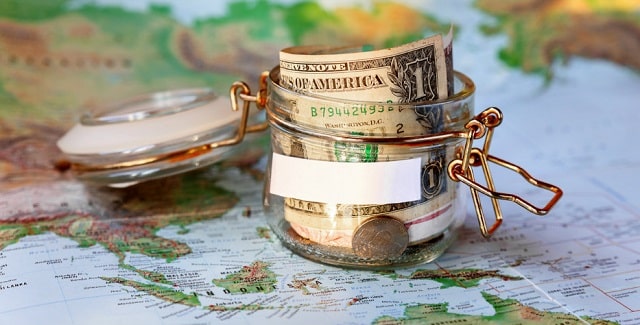
Have you recently considered making a gold investment? Besides investing in stocks and bonds, many investors decide to diversify their portfolios with this precious metal. It is well-known for its value and rich history, respected by people throughout centuries.
Gold is a commodity that investors fall back on when currencies are volatile. Consequently, gold provides insurance during tough times.
Have a look at the top eight benefits of making such an investment in gold precious metals.
Inflation Hedging
In the course of the past fifty years, gold has proven itself as an excellent inflation hedge. Its price rises along with the cost of living. Whenever the economy is unstable, or the stock market is highly volatile, investors turn to this commodity, looking for safety.
During periods of high inflation in the past, this precious metal demonstrated more power than paper currencies. When the stock market crashed, the gold price only soared. Paper currencies tend to lose their purchasing power against this commodity during periods of inflation, shrinkflation, and stagflation like today.
Nevertheless, like any type of investment, investors must be aware of the risk of loss, which is especially high for individuals not familiar with how this asset works.
Price Stability
Another benefit of investing in gold is the price stability this commodity provides. In comparison with the other market options, the price of this precious metal remains stable even during crises. Make sure to check out a review of a precious metal dealer. When a crisis hits the financial market, individuals immediately shift to gold investments while the prices keep on soaring.
The stock market, on the other hand, is much more volatile. Stock prices can drop to zero whenever negative news is shared about companies. Such a drop in price isn’t likely to happen to this precious metal, as it has a stable market value. This is why most investors have preferred it over stocks for centuries.
Moreover, price fluctuations can be tracked easily by checking the rate of this popular commodity multiple days in a row. By comparing the prices over a certain period, you will notice that fluctuations are minimal. Additionally, you can go back in history to check the price of gold over the years, which proves incredible stability even in times of global economic crises.
Relation With The US Dollar
The US dollar and gold have a long-term relationship that moves in an inverse direction. Consequently, their prices move in opposite directions. When the US dollar is weak, this precious metal and other fiat currencies increase in value. As a result, when the dollar value drops significantly compared to the other currencies, such as during the period from 1998 to 2008, investors flock to gold investments. Gold is great in 2025 as well due to record-breaking inflation.
Sometimes, there are exceptions in view of price movements, like in the event of systematic risk periods. In such periods, the value of the US dollar and gold move in an almost identical direction. The decline of this currency occurs for different reasons, including trade deficits, a large money supply increase, etc. This year, the US dollar has been incredibly volatile because of the uncertainty imposed by the COVID-19 pandemic and the somewhat struggling US economy. Recent actions by the Fed haven't fixed the issue, making gold and crypto even more viable hedges.
Portfolio Diversifier
You've heard the wise phrase "don't put all of your eggs in one basket" and that applies directly to diversifying your investment portfolio. That means not investing in only stocks, only bonds, only real estate, only cryptocurrency, or only precious metals. The gold commodity is believed to be a remarkable portfolio diversifier, as it moves in a different direction than stocks and bonds. The peaks and dips on the stock market seem to have no negative effect on the gold’s value. Investors are encouraged to consider portfolio diversification, meaning they should spread their investments out over various asset classes.
Furthermore, portfolio diversification prevents investors from losing all their assets. For instance, if one of the assets drops in value, the others will compensate for the decrease. Nevertheless, in the case of gold, diversification is usually addressed in a different way.
It is important not to invest all your money into this commodity to protect yourself from a sudden decrease in price. Just a portion of the investment capital should be invested in this precious metal, while the rest of the capital should be a combination of other assets. It pays to learn why gold still matters in the new age of investing.
Safe Haven
Another benefit of gold investments is the role this commodity acquires as a safe haven. Economic and political uncertainties have become a reality in the modern world, which is when investors look for a safe haven.
By taking a look at history, you will notice investors holding gold managed to protect their substantial wealth and even escape from regions of turmoil with its help. Any news events that predict economic uncertainty on a global level increase the value of this precious metal.
Soaring Demand
Gold investments benefit investors owing to the increasing demand for this precious metal. The increase in the wealth of leading market economies has boosted the demand for this commodity. In some counties like China and India, this precious metals asset is highly associated with their culture. In China, bars are considered a traditional saving form, which makes demand stable for Chinese investors.
In contrast, India is the second-largest nation known for its gold consumption, especially for jewelry. The highest interest for this precious metal occurs during the Indian wedding season taking place in October.
Protection Against Deflation
Another advantage of making such investments is the protection against deflation. This term describes a period when prices decrease, business activity is slower, and the economy copes with excessive debt. Deflation hasn’t been experienced on a worldwide level since the 1930s during the Great Depression. Probably slight deflation has also happened in 2008 during the financial crisis in certain regions of the world. Gold always maintains its price and power.
Maintenance Of Value
The value of gold has been maintained throughout centuries, unlike the value of paper currencies. It is a way of passing on and preserving wealth from a generation to the following one. The specific properties of this metal have been valued since ancient times. It is resistant to corrosion and melts easily over a flame. There are many industrial applications of the precious metal gold that will keep its value high during all eras. Gold also enjoys scarcity so a limited supply means a higher demand.
Final Thoughts On Gold Investing
Investors cannot go wrong by adding this commodity to their portfolios. Gold provides financial coverage in times of financial and geopolitical uncertainty! Don't miss out on this golden opportunity to add the top precious metals option to your profitable portfolio.



